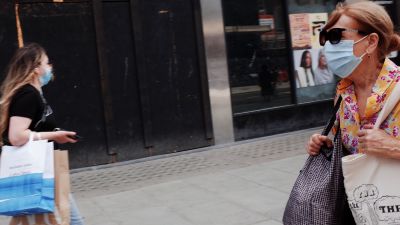Covid: Should we wear face coverings outdoors?

Pictures over the weekend showing crowds in parks and on beaches across the country suggest the government's "stay at home" message is not getting through to everyone.
Scientists worried about the new faster spreading virus, rising coronavirus cases, hospital admissions and deaths, are putting more pressure on the government to impose tougher restrictions.
Speaking during a visit to a vaccination centre on Monday, Boris Johnson warned that if people do not follow Covid measures, then the rules could be tightened.
It has been suggested that the wearing of masks outdoors could be among any new measures.
And today, Borough Market in London has become the first outdoor space in the UK to legally enforce the wearing of face masks.
From Monday, customers and vendors will face a £50 fine if they do not wear a face covering in and around the stalls.
Currently it is the law to wear a face covering in all indoor public places, but what do scientists say about the benefits of wearing them outside?
It's a good idea to wear face coverings in outdoor queues or markets
The Chief Medical Officer for England, Professor Chris Whitty, said on Monday that there are certain places where it's a good thing.
Speaking to BBC Radio 4's Today programme, he said: "If people, for example, are crowded together in a queue outdoors, if they’re really huddled together round a market stall or something, that is a risk with this virus and in that situation there might be some logic to people thinking about wearing masks.”
Other experts agree.
Dr Shaun Fitzgerald from the University of Cambridge, whose research includes natural ventilation in buildings says: "If you are outdoors and there are other people around, then if the air is relatively stagnant the risk will be higher especially if you are stationary.
"If you are queuing at a market stall which is only really open to one side then this is very different from passing someone on a walk by the sea."
Outdoor transmission is much lower than indoors
It's now well known that scientists believe the virus is much less contagious outdoors than in.
In fact, a study by Japanese scientists found that the risk of spreading the disease is nearly 19 times higher inside.
While it didn't rule out outdoor transmission as it's difficult to prove, another study in China found that out of more than 7,000 cases, only one outdoor outbreak was traced.
Professor Keith Neal, an epidemiologist from the University of Nottingham added his view on Monday, saying: "It is unlikely that the new variant has much effect on outdoor transmission given the inherently low risk when outside with distancing.
"Air movements and the ability to stay further apart are independent of the virus’s infectivity.
"Walking or running past someone is such a fleeting contact then the possibility of infection is incredibly low and approaches zero."
Masks don't work if they get wet
A wet mask loses its protective properties and becomes useless.
So damp and wet weather will render your mask ineffective.
The same goes if it's cold, because your breath produces droplets of moisture which sticks to the inside of the material.
Professor of Medicine Paul Hunter from The Norwich School of Medicine says: "This may not matter if you are outdoors but if you are then moving indoors with a wet facemask this is likely to be bad news."
The World Health Organization recommends immediately replacing wet face coverings.
Masks are not a substitute for social distancing
Staying two metres apart from people when you're out and about should be your first priority. Masks are no replacement for social distancing.
Professor Neal adds: “Standing in queues, such as for supermarkets, for prolonged periods with less than two metres distance puts people at a substantially higher risk of spreading or catching the virus than simply passing on the pavement.
"In these circumstances wearing masks is prudent but more distancing is required. Better still would be two metre distance markers for the queue."